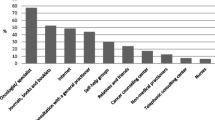Abstract
Not only the people with a disease but also their family members are increasingly investigating illness-relevant subjects on the Internet. The focus of this article deals with the questions: Why do family members conduct research on the net? Do they use the net for themselves or do they pass on internet-based information to the patients? How does the information passed on influence therapy decisions? The question of how the relatives of women with breast cancer and men with prostate cancer research illness-related subjects was examined by means of an online questionnaire. The survey comprised a total of 113 participants. Those surveyed came from Germany (93%), Austria (2%) and Switzerland (2%). The family members used the Internet primarily to inform themselves (91%) but also to convey information further to the sick person (78%). Approximately 40% said that the internet information they had found influenced treatment-relevant decisions. The main conclusions are that families judge the Internet as a great help and often do research for ill people who are not confident with this medium. Use of the Internet for illness-relevant information thus leads more often to reinforcement of the decision concerned than to non-compliance.
Similar content being viewed by others
Notes
The original source on the Net was no longer accessible (14 July 2005).
The whole study contains three groups: family members, women with breast cancer (n=370) and men with prostate cancer (n=193).
No comparable investigation of the partners of men with prostate cancer is known to us, but one can assume that the results would turn out similarly.
References
Broom A (2005) Virtually He@lthy: the impact of Internet use on disease experience and the doctor–patient relationship. Qual Health Res 15:325–345
Bundesministerium für Familien, Senioren, Frauen und Jugend (ed) (2001) Bericht zur gesundheitlichen Situation von Frauen in Deutschland. Kohlhammer, Berlin
Corbin JM, Strauss AL (1988) Weiterleben lernen. Leben mit chronischer Krankheit. Piper, München
Coulter A, Magee H (eds) (2003) The European patient of the future. Open University Press, Maidenhead
Faller H et al (1995) Soziale Unterstützung und soziale Belastung bei Tumorkranken und ihren Partnern. Z Psychosom Med 41:141–157
Gaisser A (2004) Informationsbedarf von Krebspatienten im Spiegel der telefonischen Beratung des Krebsinformationsdienstes KID. In: Bartsch HH, Weis J (eds) Gemeinsame Entscheidung in der Krebstherapie. Arzt und Patient im Spannungsfeld der Shared Decision. Karger, Basel, pp 29–45
Hautzinger M, Janssen PL (1995) Psychotherapeutische Grundlagen der psychosozialen Onkologie. Psychotherapeut 40:313–323
Hurrelmann K, Kolip P (ed) (2002) Geschlecht, Gesundheit und Krankheit. Männer und Frauen im Vergleich. Huber, Bern
Jähn K, Strehlow I (2004) Internet und Medizininformation. In: Jähn K, Nagel E (eds) e-Health. Springer, Berlin, pp 85–90
Janetzko D (1999) Statistische Anwendungen im Internet. Addison-Wesley, München
Kirschning S et al (2004) Krebserkrankung und Internet-Nutzung—Konzept und Verlauf einer Online-Befragung. Prev Rehabil 16 (4):162–176
Pereira J et al (2000) Internet usage among women with breast cancer: an exploratory study. Clin Breast Cancer 1(2):148–153
Satterlund M, McCaul K, Sandgren A (2003) Information gathering over time by breast cancer patients. J Med Internet Res 5:e15
Scheiber A, Gründel M (2000) Virtuelle Gemeinschaften? Das Internet als Informations-und Diskussionsforum für Krebspatienten. In: Jazbinsek D (ed) Gesundheitskommunikation. Westdeutscher, Wiesbaden, pp 164–183
Schönberger C, von Kardorff E (2004) Mit dem kranken Partner leben. Anforderungen, Belastungen und Leistungen von Angehörigen Krebskranker. Leske & Budrich, Opladen
Schulz K-H et al (1998) Krebspatienten und ihre Familien. Wechselseitige Belastung und Unterstützung. Schattauer, Stuttgart
TNS Infratest, Initiative D 21 (ed) (2005) (N) Onlineratlas 2005
Verres R (1996) Zur Kommunizierbarkeit von Angst in der Arzt- Patient- Beziehung. In: Lang H, Faller, H (ed) Das Phänomen Angst—Pathologie, Genese und Therapie. Suhrkamp, Frankfurt/Main
Ziebland S et al (2001) How the internet affects patients’ experience of cancer: a qualitative study. BMJ 328:334
Acknowledgement
This study was funded by the German Research Foundation (Deutsche Forschungsgemeinschaft, DFG). The study took place at the Institute for Rehabilitation Sciences at Humboldt University in Berlin.
Author information
Authors and Affiliations
Corresponding author
Rights and permissions
About this article
Cite this article
Kirschning, S., von Kardorff, E. & Merai, K. Internet use by the families of cancer patients—help for disease management?. J Public Health 15, 23–28 (2007). https://doi.org/10.1007/s10389-006-0070-4
Received:
Accepted:
Published:
Issue Date:
DOI: https://doi.org/10.1007/s10389-006-0070-4




